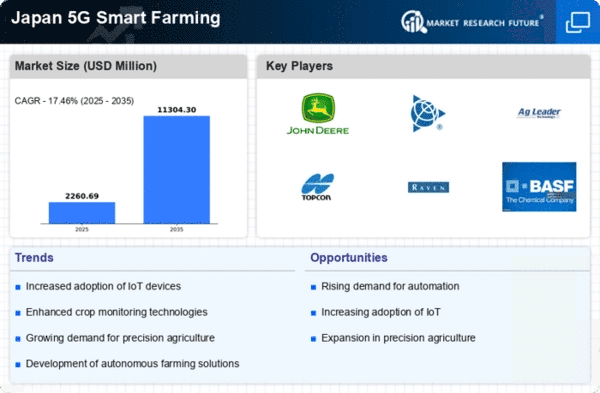Advancements in Precision Agriculture
Precision agriculture is becoming a cornerstone of the 5g smart-farming market in Japan. The ability to utilize high-speed data transmission allows farmers to implement precise farming techniques, such as variable rate application of fertilizers and pesticides. This not only enhances crop yields but also minimizes resource wastage. According to recent estimates, precision agriculture can increase productivity by up to 20% while reducing input costs by approximately 15%. As farmers seek to maximize efficiency and profitability, the adoption of 5g-enabled precision agriculture solutions is likely to surge, driving growth in the market.
Integration of AI and Machine Learning
The integration of artificial intelligence (AI) and machine learning into the 5g smart-farming market is transforming agricultural practices in Japan. These technologies enable predictive analytics, which can forecast crop yields and identify potential issues before they escalate. By leveraging 5g connectivity, farmers can access vast amounts of data in real-time, allowing for more informed decision-making. This trend is particularly relevant as Japan faces labor shortages in agriculture, with the workforce declining by 20% over the past decade. AI-driven solutions can help mitigate these challenges, suggesting that the market for smart farming technologies will likely expand as farmers seek innovative ways to enhance productivity.
Rising Demand for Sustainable Agriculture
The 5g smart-farming market in Japan is experiencing a notable shift towards sustainable agricultural practices. As consumers increasingly prioritize eco-friendly products, farmers are compelled to adopt technologies that minimize environmental impact. The integration of 5g technology facilitates real-time monitoring of soil health, crop conditions, and resource usage, enabling farmers to optimize inputs and reduce waste. This trend aligns with Japan's commitment to sustainability, as the government aims to reduce greenhouse gas emissions by 26% by 2030. Consequently, the demand for smart farming solutions that leverage 5g connectivity is expected to grow, potentially increasing market value significantly.
Increased Investment in Agricultural Technology
Investment in agricultural technology is a significant driver of the 5g smart-farming market in Japan. With the government and private sector recognizing the potential of advanced technologies, funding for research and development is on the rise. In 2025, it is projected that investments in agri-tech could reach ¥500 billion, reflecting a growing commitment to modernizing the agricultural sector. This influx of capital is likely to accelerate the development and deployment of 5g solutions, enabling farmers to adopt cutting-edge technologies that improve efficiency and sustainability. As a result, the market is poised for substantial growth.
Growing Consumer Awareness and Demand for Traceability
Consumer awareness regarding food safety and traceability is increasingly influencing the 5g smart-farming market in Japan. As consumers demand transparency about the origins of their food, farmers are adopting technologies that provide detailed tracking of agricultural products from farm to table. 5g technology facilitates the collection and sharing of data related to food production, ensuring that consumers can access information about farming practices and product quality. This trend is likely to drive the adoption of smart farming solutions, as farmers seek to meet consumer expectations and enhance their market competitiveness.

















Leave a Comment